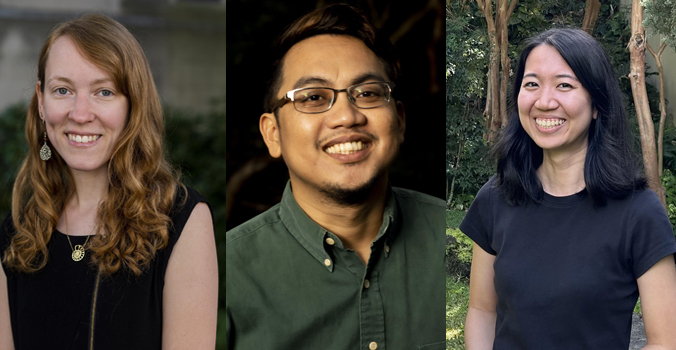
Two graduate students and a postdoctoral researcher with the University of Hawaiʻi at Mānoa’s School of Ocean and Earth Science and Technology were selected to be National Microbiome Data Collective (NMDC) Ambassadors of 2024.
A highly competitive selection through the Department of Energy’s National Microbiome Data Collaborative program, the Ambassador Program utilizes a cohort-based learning approach to train and support early career researchers.
Andrian Gajigan
Gajigan, who is pursuing a doctoral degree in oceanography with advisor and professor Grieg Steward, is investigating the interactions and dynamics between phytoplankton and giant viruses in the ocean. Gajigan is developing and observing lab-based model systems as well as field investigations, specifically, the role of giant viruses in algal bloom demise and phytoplankton succession.
“I am deeply fascinated with microbes because of their often underappreciated importance,” said Gajigan. “The world would cease to exist if we were to remove microbes on the planet. They are the chemists and sentinels of Earth’s climate.”
Kacie Kajihara
Kajihara graduated from UH Mānoa with a master’s degree in botany with advisor Nicole Hynson, who is a professor in the Pacific Biosciences Research Center (PBRC). She will soon start the Marine Biology Graduate Program to pursue a doctoral degree with Michael Rappé, professor at the Hawaiʻi Institute of Marine Biology, where she will study the genomics and ecology of SAR86, a globally prevalent group of marine bacteria.
“Through the Ambassador Program, I’ve been able to receive training on FAIR data and other data standards that put equitable science at the forefront, and I look forward to sharing this information with the UH community,” said Kajihara.
Nicola Kriefall
Kriefall is a postdoctoral researcher in PBRC co-advised by Matthew Medeiros and Hynson. Her research focuses on the roles that microorganisms play in shaping food webs, specifically looking at small pools of water where mosquitoes begin their life cycle. This area of research holds additional potential for information to combat the mosquito’s disastrous ecosystem and human health impacts—especially in Hawaiʻi, where they are invasive.
“It’s endlessly fascinating to me that single-celled microorganisms we can’t even see with the bare eye are able to take us down or prop us up,” Kriefall said. “For instance, they can be pathogenic and make us ill or reside in our gut and help us digest things we otherwise wouldn’t be able to.”
–By Marcie Grabowski

